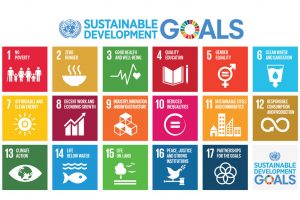
On September 25, 2015, all 193 member states of the United Nations, including the United States, unanimously adopted seventeen Sustainable Development Goals, or SDGs, to achieve by the year 2030. These goals are to ensure the well being and equal opportunity to achieve for all people across the globe.
With a new administration unilaterally pulling the U.S. out of the Paris Climate Agreement and seeking to make changes contrary to these goals, such as expanding coal mining, the people are taking it upon themselves to take action and make these goals attainable despite waning support from leaders.
Locally, three organizations exemplify the commitment to the safety, security, and success of the communities surrounding Yuba College. New Earth Market, Western Farm Workers Association, and Green Futures, a Yuba College student club are all working hard to usher in a better, more sustainable community, and support quality of life for the people around them.
In 2011, Kevin and Kellie Cotter began a business inspired by their past struggle with finding a cure for their daughter’s asthma, which she had not been born with. The ailments of their 4-year-old daughter, who was put on endless steroidal treatments and used a machine prescribed by doctors for breathing treatments, forced the Cotters to seek alternative medicine to improve her quality of life.
The Cotters sought the help of a homeopathic physician, one who practices based upon the belief in natural cures and the body’s ability to heal itself. There they learned about the effects of dairy and gluten on their daughter and witnessed the curing of her asthma with simple changes in her diet.
Kevin had been in the trucking industry for most of his life and provided his family with a comfortable living. When he came to the conclusion that money did not equate to happiness for him, he sought to do something to bring change to his community. Cotter says of his experience in finding a cure for his daughter, “Her adversity was the catalyst to build this market.”
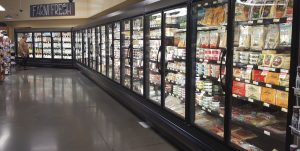
The market they created supports sustainable living in the community. In order to provide healthier options, there are a number of banned ingredients that may not be contained in any of the foods that New Earth stocks, as well as standards each supplier must adhere to before they will put their products on the shelves.
The most sustainable practices of the market lie in the way their building and systems have been designed. They have recently installed solar panels on their roof and in their Yuba City parking lot which provide at least 93% of their power. Often they make more energy than they need, and are able to send their excess back into PG&E’s power grid. In order to prevent further energy loss from their refrigeration units, the Yuba City market has added doors to both their beer and dairy cases.
New Earth’s system also recycles the energy that they do use. The heat from the condenser units on their refrigeration is recycled to provide heat in their water heaters, and the escaped cold from refrigeration units is recaptured. This allows the store to be able to remain cool without the use of air conditioning, until outside temperatures reach 100 degrees.
In addition to energy conservation throughout the market, their signs are made from reclaimed fence boards from the Cotter family home.
The market further supported sustainable goals by hiring a local contractor, Hilbers, to construct the building, creating jobs and economic growth in the community. SDG 8 calls for economic growth, productive employment and decent work for all.
Between the two stores that they now operate, one in Yuba City and one in Chico, New Earth Market employs over 100 people in a healthy and happy environment. Cotter said, “This is my happy place.”
Cotter’s commitment to his community runs deep. This February, during the Oroville Dam evacuations, the market supported the efforts of local organization Western Farm Workers Association (WFWA) and volunteers and joined Cool Hand Luke’s owner, Jesse Villicana; the restaurants kitchen manager, Manny Quinones; and Yuba City Grocery Outlet owners, Jeremy and Amy Delay, to provide food and drinks for the emergency responders and law enforcement. These responders had come from all over the state and were finding difficulty finding anything to eat because most of the community businesses were closed.
In addition to this, New Earth also supported WFWA this year by providing reusable shopping bags to be given with donated items as gifts at the annual anniversary dinner held at the Peach Tree Country Club. The annual dinner hosted by WFWA is a collaboration between area businesses and community members.
Businesses and community members donate all of the ingredients for the annual dinner and chef Eric Carter, along with his crew, cook them up in the country club kitchen for a delicious evening at the club. Local farm workers, business owners,
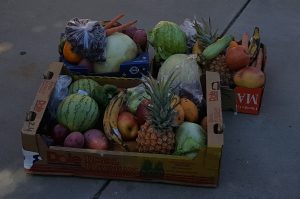
citizens, and government officials, like Yuba City Mayor, Stan Cleveland, come together to celebrate accomplishments and address the issues facing the poorest working families in the area. The effort is all volunteer and all donation as with all WFWA events and efforts.
WFWA celebrated 31 years of community organizing this year in Yuba/Sutter. In their newspaper, Western Farm Worker, they list the 17 SDGs and demonstrate their desire to push the community toward these goals. Their commitment to these goals is evidenced in their tireless efforts to reach out into the community and bring together businesses and members to support one another in the achievement of these goals.
A local letter-writing campaign to the California Public Utilities Commission has been launched by members of WFWA’s Benefit Council in an effort toward SDG number 7, which seeks to ensure access to affordable, reliable, sustainable and modern energy for all. This demands that the CPUC act to roll back increasing PG & E rates.
With the help of local community growers who donate produce from local farmers markets and swap meets, WFWA members provide a hand up to WFWA member participants through produce distributions. Weekly distributions organized by members benefit the recipients as well as the donors who do not wish to dispose of produce that may spoil before the next sale in the following week. This practice supports SDG 2, as well as 12.
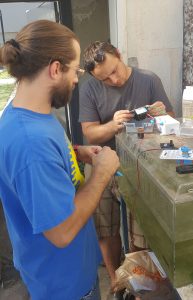
Yuba College’s Green Futures club, whose focus is on sustainable gardening practices, also aligns with the SDG plans. It maintains and harvests produce on campus for the students of Yuba College.
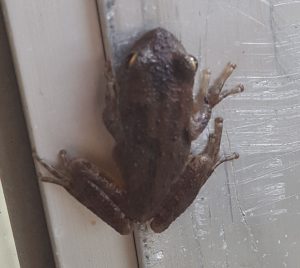
Every Monday, Green Futures members rotate responsibility harvesting tomatoes, peppers and other produce and provide it to Dusty’s Pantry on campus for our students. Garden planning for the spring semester is in the beginning process with hopes of providing more fresh produce. Vice President David Terry is also working on an aquaponics system in the greenhouse, which will utilize a system of aquariums with aquatic life that will run water and provide nutrients to the plants while filtering the water that circulates back into the aquarium units. The system is similar to aquaculture, which could eventually be used to raise fish such as tilapia as a part of a sustainable food system in the future as participation grows.
I hold both an AS in Social and Behavioral Sciences and an AA in English from Yuba College. I have been on the editorial board of Flumes, literary arts journal, and contribute to the publication of The Western Farm Worker. No one knows what the future holds!
Comment Policy: Comments are welcomed and encouraged. However, the editorial board reserves the right to edit or delete, without notice, any comments submitted to the blog. For more details, see our full Comment Policy.